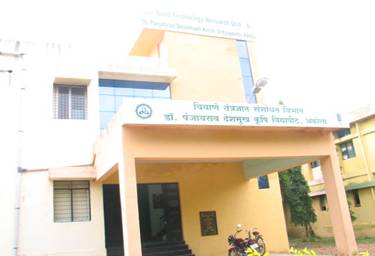Seed Technology Research Unit, Akola
|
|
|
 |
|
|
|
|
||
|
|
|
||
|
|
|
||
|
|
|
||
|
|
|
||
|
|
|
Scientists Information |
|
|
|
|
About Station

The Seed Technology Research Unit, started functioning in Dec.1979 at Dr. PDKV Akola. This unit was chosen as one of the earliest centres to be established under 1st Phase of NSP. This unit is also conducting DUS Testing Project under PPV & FRA since 2004.
 |
 |
Mandate
Mandate of the NSP (Crops)
-
To conduct, basic, applied, strategic and anticipatory research on different aspects of seed science and technology.
-
To generate basic information on seed certification standards including seed health.
-
To disseminate information and impart training on seed production, processing, storage and packaging, seed health and quality control.
-
To establish linkages with Crop Improvement Project, Seed Industry, Seed Certification Agencies, Seed Traders etc.
Mandate of the DUS Testing Project
-
To characterize and maintain the Pigeonpea varieties under DUS programme as per NTG guidelines.
-
To characterize and maintain the safflower varieties under DUS programme as per NTG guidelines
Research and other activities
The unit is mainly involved in multidisciplinary seed research including Seed Production & Certification, Seed Physiology, Storage & Testing, Seed Entomology and Seed Processing as per the approved Technical Programme of AICRP-NSP for seed quality assessment and improvement in different crop seeds. During last 20 years the research in the unit has contributed to the need based technology on the different factors of seed quality, for improvement of seed and betterment of farmers in Vidarbha region.
Ongoing Research Trials under NSP
|
I. Seed production and certification |
|
|
II. Seed Processing |
|
| III. Seed Physiology, Storage and Testing |
|
| IV. Seed Entomology |
|
| Research Trials under DUS |
|
Research Recommendations
On the basis of research studies conducted at STRU, Dr.PDKV, Akola during 1980 to 2011, 34 recommendations approved in AGRESCO.
|
Sr. No
|
Recommendations
|
Year
|
|---|---|---|
|
1
|
It is recommended that for effective seed treatment the smooth surface seed should be treated with carboxymethyl cellulose 1.5% (@ 10 ml/kg seed)
|
1991
|
|
2
|
The best media for seed testing of ricebean is between paper towels at 200-300C (alternate) or 300C constant temperature.
|
1991-92
|
|
3
|
It is indicated that application of various dyes and pigments do not affect the seed viability of green gram for storage period of 2 years.
|
1991-92
|
|
4
|
It is recommended to use silver coated packets for storing onion and chilli seeds.
|
1991-92
|
|
5
|
Use of Etherel 5 ppm concentration was found to be effective in breaking seed dormancy of groundnut seed.
|
1993-94
|
|
6
|
For grading sorghum hybrids it is recommended that a sieve of 8/64” (3.2mm) size may be used in place of presently recommended 9/64” sieve size.
|
1994
|
|
7
|
For proper evaluation of safflower seed germination, the first count should be recorded on 4th day and the final count on 10th day at 250C temperature.
|
1994-95
|
|
8
|
For maintaining seed viability, it is recommended to store the seed of sunflower and soybean in polylined gunny bag or polythene bag (300 guage)
|
1995
|
|
9
|
Supplementary hand pollination daily for 9 days for seed production of sunflower hybrid KBSH-1 is recommended.
|
1996
|
|
10
|
A sieve of 8/64” is effective and economical than presently recommended 9/64” for grading of parental line seed of sorghum CK-60B, IS-84, 2077B, CS-3541.
|
1997-98
|
|
11
|
For maintaining seed quality, soybean crop should be threshed by multicrop thresher at 500 rpm at 12 to 14 % moisture content
|
1997-98
|
|
12
|
It is recommended that fumigation of aluminium phosphide @2-3 tablets (3 g each) per cubic meter at monthly interval are required to protect pigeon pea seeds from insect infestation.
|
1998-99
|
|
13
|
Minimum Seed Certification Standard (MSCS) for germination of hybrid cottonseed should be raised to 70% instead of existing 65%
|
2003-04
|
|
14
|
For grading delinted cotton seed, a sieve size of 2.8mm and 3.2mm for small seeded varieties and medium to bold seeded varieties respectively are recommended in place of 3.9mm sieve size.
|
2004-05
|
|
15
|
For grading soybean cultivars a sieve of 3.6mm may be used in place of presently recommended 4.omm sieve.
|
2004-05
|
|
16
|
The treatment of 100ml H2SO4 for 10 minutes is recommended for wet acid delinting of cotton seed.
|
2004-05
|
|
17
|
It is recommended that for minimizing mechanical damage and maintaining seed quality inclined belt conveyor should be used in place of bucket conveyor while processing of soybean at seed processing plant.
|
2007-08
|
|
18
|
Specific gravity separator is recommended for upgrading marginal seed lots having lower germination percentage by about 10% than MSCS in cotton, soybean and safflower to an acceptable limit.
|
2007-08
|
|
19
|
For grading seed of safflower varieties a sieve of 2.2mm(s) may be used in place of presently recommended 1.2mm
|
2008-09
|
|
20
|
It is recommended that an isolation distance of 5m should be adopted in place of existing 3m for maintaining the genetic purity in seed production of soybean.
|
2008-09
|
Seed Testing
In addition to NSP experiments and DUS Testing project, the Seed Technology Research Unit, sharing important work of university i.e. testing the seed sample of different crop kinds received from 34 seed production center of Dr. PDKV, Akola for quality parameter. About 1800 seed samples of all crop kinds were tested in this unit during 2011-12.
Transfer of Technology
-
Transfer of technology through organizing training programmes for farmers and demonstration on farmer’s field.
-
Publishing popular articles through various newspaper and magazines.
Contact Information
Seed Research Officer
Seed Technology Research Unit
Dr. PDKV, Akola- 444104 (MS)
Phone (Office) – 0724- 2259041
Fax – 0724- 2259041
Email : seed_technology@yahoo.co.in





 Krishikosh Repository
Krishikosh Repository




